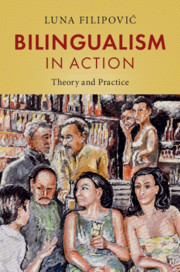Book contents
- Bilingualism in Action
- Bilingualism in Action
- Copyright page
- Dedication
- Contents
- Figures
- Tables
- Preface
- Acknowledgements
- 1 Introduction
- 2 Bilingualism Research
- 3 Introducing CASP for Bilingualism
- 4 Action Time
- 5 Bilingual Cognition
- 6 Bilinguals in Action as Language Professionals
- 7 Conclusions and Future Directions
- References
- Language Index
- Name Index
- Subject Index
1 - Introduction
The Research Domain of Applied Bilingual Studies
Published online by Cambridge University Press: 10 October 2019
- Bilingualism in Action
- Bilingualism in Action
- Copyright page
- Dedication
- Contents
- Figures
- Tables
- Preface
- Acknowledgements
- 1 Introduction
- 2 Bilingualism Research
- 3 Introducing CASP for Bilingualism
- 4 Action Time
- 5 Bilingual Cognition
- 6 Bilinguals in Action as Language Professionals
- 7 Conclusions and Future Directions
- References
- Language Index
- Name Index
- Subject Index
Summary
Very simple. Or not? In one respect, knowing two languages, not necessarily to the same degree, can be a criterion for saying that somebody is bilingual. However, a more precise definition is required, since we cannot really claim that an adult English speaker, for instance, who has just embarked on a beginner’s course in French is bilingual in the same way as somebody who has been speaking both French and English from birth. We normally think of bilinguals as people with a substantial degree of knowledge and competence in two languages. Finding a proper definition of what ‘substantial’ means in the context of bilingualism is no small task. A very high level of competence in any two languages, with similar frequency of use in both, is a possible criterion that we can use to qualify a speaker as bilingual. On the other hand, all second-language learners are bilingual to different degrees, so the term ‘bilingual’ could apply to them as well, probably to more advanced learners rather than those who are just starting to learn a second language (an L2).
- Type
- Chapter
- Information
- Bilingualism in ActionTheory and Practice, pp. 1 - 10Publisher: Cambridge University PressPrint publication year: 2019



